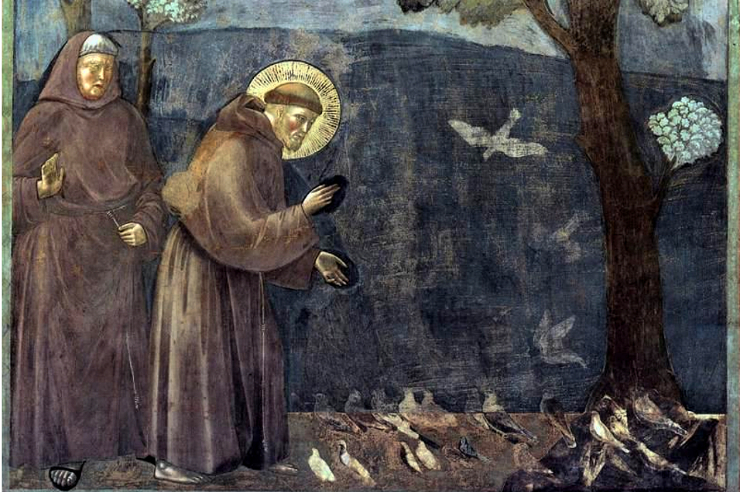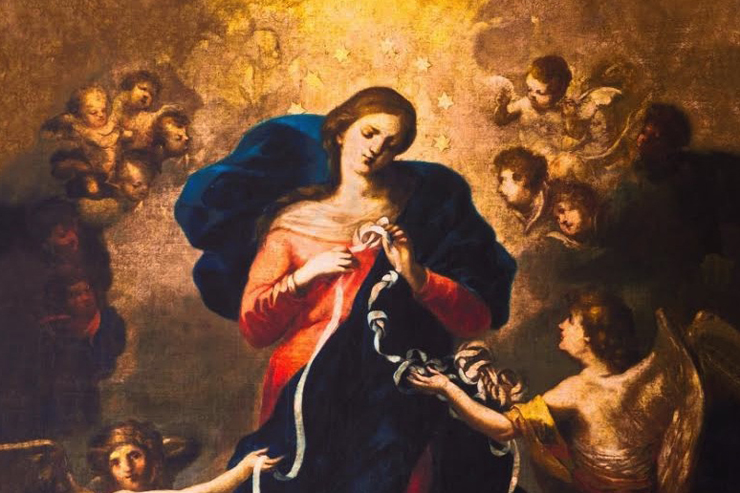!["Legend of St. Francis [15] Sermon to the Birds" (detail) by Giotto](http://www.integratedcatholiclife.org/wp-content/uploads/giotto-legend-of-st-francis-sermon-to-the-birds-detail-featured-w740x493.jpg)
“Legend of St. Francis [15] Sermon to the Birds” (detail) by Giotto
In a few weeks, I get to go back to one of my favorite places in the world: Assisi.
The medieval hillside town is like no other place in this world, and there’s something about walking those streets that has a way of re-calibrating your life. Many people try to go to Assisi as a day trip, but I’m a firm believer that to truly experience Assisi requires staying overnight. As you watch the sun fall behind the Umbrian hills from the piazza outside Santa Chiara or from the top of Rocca Maggiore (the two best places to watch the sunset in Assisi), the tourists disappear on their buses and you are left with the town of Francis and Clare.
I believe that few saints are as misunderstood as St. Francis. We love to talk about his love for animals and we are intrigued by his radical selflessness and poverty. But is the St. Francis we love to put next to our birdbath an adequate portrayal of the man who rebuilt the Church in the thirteenth century? Or have we created a more comfortable and more politically correct Francis so that he’s easier to love?
One example is the famous quote of St. Francis, “Preach the Gospel, and if necessary, use words.”
The problem is… he never said that. Even though it’s one of the most ubiquitous quotes attributed to him, there is no evidence of the quote in any of his biographies until the twentieth century.
While the sentiment is good—they must know we are Christians by our lives—it is often used to give us a pass for not sharing the Gospel message with words. Yes, our neighbors, friends, and family should know that we are Christians because we live differently. Our faith is not something restricted to what we do on Sunday morning, and the Creed we profess every week must impact our behaviors, choices, and actions throughout the week. Once we allow our faith to impact our daily lives, the world will take notice. Blessed Paul VI reminded us that it is “primarily by her conduct and by her life that the Church will evangelize the world” (Evangelii Nuntiandi, 41).
But that doesn’t give us a pass when it comes to actually speaking about the Gospel message. St. Peter instructed his disciples, “Always be prepared to make a defense to any one who calls you to account for the hope that is in you” (1 Pt 3:15). Yes, it presupposes that we are living lives that make people call us to account for the hope. But it requires that we speak words of defense and explanation for that hope. We have to be willing to preach the Gospel with words.
For too many years, we’ve acted like evangelization isn’t something Catholics do. Door-to-door inquiries are left to the Jehovah Witnesses and the Mormons. Asking people if they’re saved is left to our Protestant brothers and sisters. We just go to Mass on Sunday and take care of ourselves. Right?
Not quite.
Why is evangelization a Catholic imperative?
1) The Gospel is good news.
What would we do if we just read the best book? Wouldn’t we tell a friend about it? What about if we just discovered the most delicious new restaurant, with fantastic and satisfying dishes and a great atmosphere? Unless we were selfish and didn’t want anyone to know about it… wouldn’t we tell our friends? Have you ever seen a movie where you leave the theatre and just want to tell everyone we know to go see it for themselves? Is it because we think we’re better than everyone else or because we want them to feel bad they haven’t seen it?
Of course not. We want to share it. Why? Because it’s good and we want others to experience the book, the restaurant, or the movie.
So why don’t we tell people about the faith? Why aren’t we rushing out to make sure everyone knows the Gospel? Do we, deep down, not think it’s good news? Do we not think our friends will benefit from hearing the Truth?
2) It’s your responsibility
Like it or not, when you’re baptized, you’re given the commission to spread the Gospel. What was the last thing Christ told his Apostles before he ascended? In Mt 28, he gave his followers the Great Commission: “Go, make disciples of all nations!” He didn’t say, “Go take care of yourselves and don’t worry about anyone else!” No—he sent them out.
The sacraments of baptism and confirmation are the beginning of our Christian life, and they’re about being sent out to bring others Christ. It’s the call of our baptism to bring others into Christ’s Body, the Church.
3) “We” and Jesus
It’s not about me and Jesus. Sure, we need a personal relationship with Jesus. But it’s not just about getting to heaven yourself. You’re baptized into the Church, into the Body of Christ, and it’s a family affair. The person who sits in front of you at church, your next door neighbor who doesn’t go to church, and your coworker who ridicules the Church—if they’re baptized, they’re your brother or sister in Christ. If they’re not baptized, you want them to be. We’re a community. And you need to help them get to heaven, too.
It seems like we often preach today—maybe not with our words, but with our actions, “Jesus is the way the truth and the life! …Unless you’ve found another way, truth, and life.” But that’s not what Christ said. The bottom line is—if you really believe He is the way, the truth, and the life… don’t you want to tell people about it?
St. Francis would be the last person to tell us we didn’t need to preach the Gospel with words. He was so passionate for the truth he couldn’t stop preaching it! Why do you think he preached to the birds? Yes, we must live the Gospel. But that’s only part of our responsibility as the baptized. If you really believe in Christ and what He has done for you, you’ll want to tell everyone you know about Him. And St. Francis would approve.














